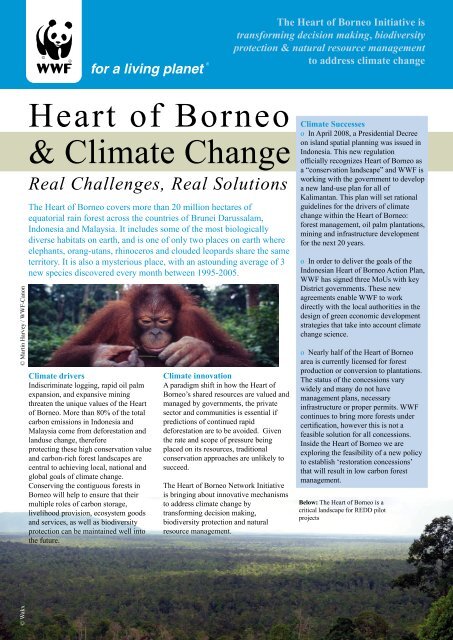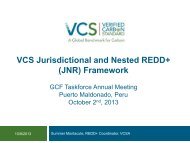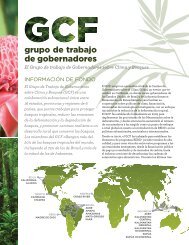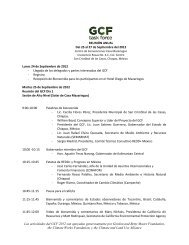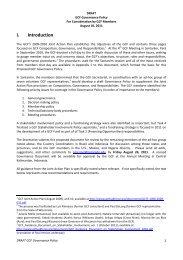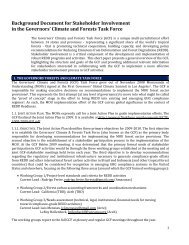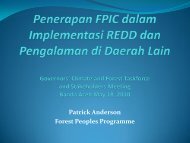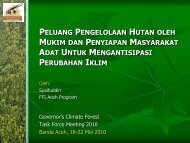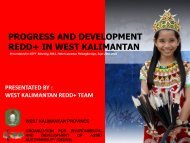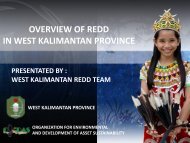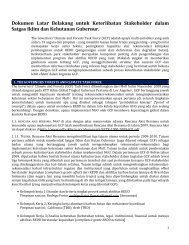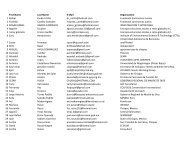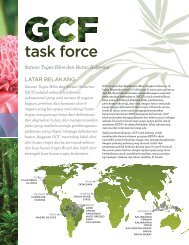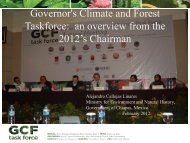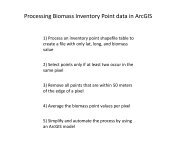Heart of Borneo & Climate Change - Governors' Climate and Forests ...
Heart of Borneo & Climate Change - Governors' Climate and Forests ...
Heart of Borneo & Climate Change - Governors' Climate and Forests ...
Create successful ePaper yourself
Turn your PDF publications into a flip-book with our unique Google optimized e-Paper software.
The <strong>Heart</strong> <strong>of</strong> <strong>Borneo</strong> Initiative is<br />
transforming decision making, biodiversity<br />
protection & natural resource management<br />
to address climate change<br />
© Wakx © Martin Harvey / WWF-Canon<br />
<strong>Heart</strong> <strong>of</strong> <strong>Borneo</strong><br />
& <strong>Climate</strong> <strong>Change</strong><br />
Real Challenges, Real Solutions<br />
The <strong>Heart</strong> <strong>of</strong> <strong>Borneo</strong> covers more than 20 million hectares <strong>of</strong><br />
equatorial rain forest across the countries <strong>of</strong> Brunei Darussalam,<br />
Indonesia <strong>and</strong> Malaysia. It includes some <strong>of</strong> the most biologically<br />
diverse habitats on earth, <strong>and</strong> is one <strong>of</strong> only two places on earth where<br />
elephants, orang-utans, rhinoceros <strong>and</strong> clouded leopards share the same<br />
territory. It is also a mysterious place, with an astounding average <strong>of</strong> 3<br />
new species discovered every month between 1995-2005.<br />
<strong>Climate</strong> drivers<br />
Indiscriminate logging, rapid oil palm<br />
expansion, <strong>and</strong> expansive mining<br />
threaten the unique values <strong>of</strong> the <strong>Heart</strong><br />
<strong>of</strong> <strong>Borneo</strong>. More than 80% <strong>of</strong> the total<br />
carbon emissions in Indonesia <strong>and</strong><br />
Malaysia come from deforestation <strong>and</strong><br />
l<strong>and</strong>use change, therefore<br />
protecting these high conservation value<br />
<strong>and</strong> carbon-rich forest l<strong>and</strong>scapes are<br />
central to achieving local, national <strong>and</strong><br />
global goals <strong>of</strong> climate change.<br />
Conserving the contiguous forests in<br />
<strong>Borneo</strong> will help to ensure that their<br />
multiple roles <strong>of</strong> carbon storage,<br />
livelihood provision, ecosystem goods<br />
<strong>and</strong> services, as well as biodiversity<br />
protection can be maintained well into<br />
the future.<br />
<strong>Climate</strong> innovation<br />
A paradigm shift in how the <strong>Heart</strong> <strong>of</strong><br />
<strong>Borneo</strong>’s shared resources are valued <strong>and</strong><br />
managed by governments, the private<br />
sector <strong>and</strong> communities is essential if<br />
predictions <strong>of</strong> continued rapid<br />
deforestation are to be avoided. Given<br />
the rate <strong>and</strong> scope <strong>of</strong> pressure being<br />
placed on its resources, traditional<br />
conservation approaches are unlikely to<br />
succeed.<br />
The <strong>Heart</strong> <strong>of</strong> <strong>Borneo</strong> Network Initiative<br />
is bringing about innovative mechanisms<br />
to address climate change by<br />
transforming decision making,<br />
biodiversity protection <strong>and</strong> natural<br />
resource management.<br />
<strong>Climate</strong> Successes<br />
o In April 2008, a Presidential Decree<br />
on isl<strong>and</strong> spatial planning was issued in<br />
Indonesia. This new regulation<br />
<strong>of</strong>ficially recognizes <strong>Heart</strong> <strong>of</strong> <strong>Borneo</strong> as<br />
a “conservation l<strong>and</strong>scape” <strong>and</strong> WWF is<br />
working with the government to develop<br />
a new l<strong>and</strong>-use plan for all <strong>of</strong><br />
Kalimantan. This plan will set rational<br />
guidelines for the drivers <strong>of</strong> climate<br />
change within the <strong>Heart</strong> <strong>of</strong> <strong>Borneo</strong>:<br />
forest management, oil palm plantations,<br />
mining <strong>and</strong> infrastructure development<br />
for the next 20 years.<br />
o In order to deliver the goals <strong>of</strong> the<br />
Indonesian <strong>Heart</strong> <strong>of</strong> <strong>Borneo</strong> Action Plan,<br />
WWF has signed three MoUs with key<br />
District governments. These new<br />
agreements enable WWF to work<br />
directly with the local authorities in the<br />
design <strong>of</strong> green economic development<br />
strategies that take into account climate<br />
change science.<br />
o Nearly half <strong>of</strong> the <strong>Heart</strong> <strong>of</strong> <strong>Borneo</strong><br />
area is currently licensed for forest<br />
production or conversion to plantations.<br />
The status <strong>of</strong> the concessions vary<br />
widely <strong>and</strong> many do not have<br />
management plans, necessary<br />
infrastructure or proper permits. WWF<br />
continues to bring more forests under<br />
certification, however this is not a<br />
feasible solution for all concessions.<br />
Inside the <strong>Heart</strong> <strong>of</strong> <strong>Borneo</strong> we are<br />
exploring the feasibility <strong>of</strong> a new policy<br />
to establish ‘restoration concessions’<br />
that will result in low carbon forest<br />
management.<br />
Below: The <strong>Heart</strong> <strong>of</strong> <strong>Borneo</strong> is a<br />
critical l<strong>and</strong>scape for REDD pilot<br />
projects
Influencing business<br />
o In order to meet the rapidly growing<br />
global dem<strong>and</strong> for edible oil <strong>and</strong><br />
alternative fuels, the extent <strong>of</strong> palm oil<br />
plantations in Indonesia <strong>and</strong> Malaysia<br />
could double in the next decade. WWF<br />
has been working with Cargill <strong>and</strong> other<br />
partners in <strong>and</strong> around the <strong>Heart</strong> <strong>of</strong><br />
<strong>Borneo</strong> to assess the potential for<br />
exp<strong>and</strong>ing production to the vast existing<br />
degraded l<strong>and</strong>s. The research concludes<br />
that a combination <strong>of</strong> increased<br />
productivity through improved<br />
management practices, new oil palm<br />
development on degraded l<strong>and</strong>s, <strong>and</strong> a<br />
complete ban on oil palm development<br />
on peat <strong>and</strong> forest l<strong>and</strong>s, provides the<br />
most viable means to achieve the<br />
interrelated goals <strong>of</strong> palm oil supply,<br />
mitigation <strong>of</strong> greenhouse gas emissions,<br />
<strong>and</strong> biodiversity conservation.<br />
HoB Peatl<strong>and</strong>s Action Plan, a new<br />
partnership...<br />
o A new WWF partnership with<br />
St<strong>and</strong>ard Chartered Bank <strong>and</strong> the UK<br />
government for the <strong>Heart</strong> <strong>of</strong> <strong>Borneo</strong><br />
Brunei program, is exp<strong>and</strong>ing<br />
cooperation between the three countries<br />
to develop common solutions to the<br />
problems <strong>of</strong> peatl<strong>and</strong> degradation. The<br />
ultimate goal <strong>of</strong> this project is to lead to a<br />
reduction in CO 2<br />
emissions, fire <strong>and</strong> haze<br />
from degraded peatl<strong>and</strong>s. The Action<br />
Plan will recommend policy changes,<br />
develop innovative restoration practices<br />
<strong>and</strong> transfer knowledge <strong>and</strong><br />
technology across the three countries to<br />
ensure rehabilitation <strong>and</strong> conservation <strong>of</strong><br />
the carbon-rich peatl<strong>and</strong> ecosystems.<br />
Right: Segama Forest<br />
Reserve, Sabah, Malaysia<br />
Carbon baseline <strong>and</strong> prepaREDDness<br />
o In preparation for the December 2009<br />
UNFCCC COP in Copenhagen, WWF is<br />
working with world-class research<br />
partners to develop an initial carbon<br />
baseline for the <strong>Heart</strong> <strong>of</strong> <strong>Borneo</strong>. This<br />
work will set the parameters for<br />
developing REDD methodologies within<br />
key carbon-rich l<strong>and</strong>scapes. Additionally,<br />
the <strong>Heart</strong> <strong>of</strong> <strong>Borneo</strong> teams in Indonesia<br />
<strong>and</strong> Malaysia are beginning to build<br />
effective capacity in governmental<br />
agencies, private sector companies,<br />
financial institutions <strong>and</strong> local partners<br />
for the implementation <strong>of</strong> REDD plans<br />
<strong>and</strong> policies. This work is closely linked<br />
with other Network Initiatives, such as<br />
the Forest-based Carbon <strong>and</strong> Global<br />
Deal.<br />
Payment for Ecosystem Services (PES)<br />
o Adequately valuing <strong>and</strong><br />
compensating for the ecosystem services<br />
<strong>of</strong>fered by forests is a means <strong>of</strong> ensuring<br />
their protection <strong>and</strong> sustainable<br />
management in the face <strong>of</strong> rapid climate<br />
change. A two-year old PES pilot project<br />
in the Kapuas Hulu District in the <strong>Heart</strong><br />
<strong>of</strong> <strong>Borneo</strong> is now providing the<br />
knowledge <strong>and</strong> lessons <strong>of</strong> how to<br />
effectively link revenue generation from<br />
ecosystem services for both<br />
communities <strong>and</strong> local governments to<br />
protection <strong>and</strong> sustainable management<br />
<strong>of</strong> natural resources.<br />
Securing carbon-rich l<strong>and</strong>scapes<br />
o Through new partnerships with<br />
various government <strong>and</strong> private sector<br />
partners, new funding is being directed<br />
at securing carbon-rich l<strong>and</strong>scapes in the<br />
<strong>Heart</strong> <strong>of</strong> <strong>Borneo</strong>. Work is underway in<br />
both Indonesia <strong>and</strong> Malaysia to reforest<br />
degraded concessions that contain<br />
critical populations <strong>of</strong> orangutans <strong>and</strong><br />
pygmy elephants. Similarly, enhanced<br />
protection <strong>of</strong> national parks through<br />
buffer zone management to reduce forest<br />
fires <strong>and</strong> encroachment will significantly<br />
reduce carbon emissions.<br />
© Sylvia Jane Yorath / WWF<br />
WWF is one <strong>of</strong> the world’s largest <strong>and</strong> most experienced independent<br />
conservation organizations, with almost 5 million supporters <strong>and</strong> a global<br />
network active in more than 100 countries.<br />
WWF’s mission is to stop the degradation <strong>of</strong> the planet’s natural environment<br />
<strong>and</strong> to build a future in which humans live in harmony with nature, by:<br />
- conserving the world’s biological diversity<br />
- ensuring that the use <strong>of</strong> renewable natural resources is sustainable<br />
- promoting the reduction <strong>of</strong> pollution <strong>and</strong> wasteful consumption.<br />
For more information<br />
please contact:<br />
Adam J. Tomasek<br />
Leader, <strong>Heart</strong> <strong>of</strong> <strong>Borneo</strong><br />
Network Initiative<br />
WWF<br />
email: atomasek@wwf.or.id<br />
www.p<strong>and</strong>a.org/borneo


